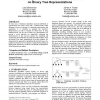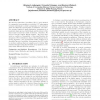928 search results - page 172 / 186 » Evolutionary algorithms and matroid optimization problems |
126
click to vote
GECCO
2009
Springer
15 years 9 months ago
2009
Springer
The need for a stopping criterion in MOEA’s is a repeatedly mentioned matter in the domain of MOOP’s, even though it is usually left aside as secondary, while stopping criteri...
138
Voted
GECCO
2006
Springer
15 years 6 months ago
2006
Springer
In some cases, evolutionary algorithms represent individuals as typical binary trees with n leaves and n-1 internal nodes. When designing a crossover operator for a particular rep...
GECCO
2008
Springer
15 years 3 months ago
2008
Springer
We introduce fitnessless coevolution (FC), a novel method of comparative one-population coevolution. FC plays games between individuals to settle tournaments in the selection pha...
145
click to vote
GECCO
2009
Springer
15 years 9 days ago
2009
Springer
The covariance matrix adaptation evolution strategy (CMAES) has proven to be a powerful method for reinforcement learning (RL). Recently, the CMA-ES has been augmented with an ada...
110
click to vote
GECCO
2007
Springer
15 years 8 months ago
2007
Springer
This research screens the tuning parameters of a combinatorial optimization heuristic. Specifically, it presents a Design of Experiments (DOE) approach that uses a Fractional Fac...


